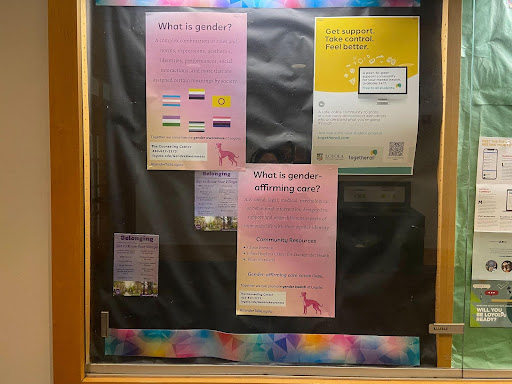Have you noticed these pink posters while walking around campus? These posters are part of The Counseling Center’s Public Health Campaign for the semester, which aims to educate the entire Loyola community on gender. Alé Terrero ‘23 believes that this public health campaign is a good start for educating the Loyola community.
“This is an extremely new conversation for so many people,” Alé said. “It could be something they might be hearing for the first time at college. It is not my job or the job of other trans students to educate others.”
He shares his experience with his own gender identity and the importance of having open conversations about gender on campus. He recalls growing up experiencing both sides of the stereotypical gender norms. When reflecting on his past and the stuff he enjoyed as a child he said, “I like what I like.”
“I remember when puberty began, I felt so uncomfortable and so outside of myself. I was like ‘something is not right here’,” Alé said.
As gender roles became a more prominent aspect of his life, he realized that these roles, especially those imposed on him by his family, conflicted with his gender identity. Alé first learned about transgender individuals in the 6th grade, which led to his own research and journey of self-discovery. He felt like he resonated a lot with the stories of transgender people he had read about online.
“I would gaslight myself by saying ‘You are just trying to be special.’ I would get actual pain in my chest sometimes and be so upset that it wasn’t me who was able to change.” Conversations on gender are not easy.
“My parents are still confused because this is all very new to them,” said Alé. He brought up this topic with his therapist and then spoke to his father about his gender identity at the age of 12.
“My father told me ‘I want you to wait until you are a little older so we can make sure,’ and well, I am a little older now and I can say I am still sure.” Due to gender stereotypes and roles imposed by society, Alé felt a need to reject any femininity, despite his interest in things seen as feminine.
He said, “Passing was such a big thing to me. I really committed to the idea that masculinity would be the only way to be accepted as a trans man.” However, his perspective on gender identity has shifted. During his time at Loyola, Alé has become more independent and has had more freedom to express his gender identity.
“I now realize there is a real power in being both and feeling yourself and really secure in who you are exploring both femininity and masculinity,” he said. While Loyola has provided Alé with space to express his gender identity, there are still spaces on campus where he does not feel safe, which he attributes to students and the faculty’s lack of education on gender.
“They may be getting misinformation and due to that misinformation, it is causing a lot of wrong perceptions and false ideas of what gender is and what being transgender is.” These false ideas of gender make it difficult for students to feel comfortable expressing their gender identity to the fullest. For many, the conversation on gender starts and ends with pronouns. Alé appreciates the efforts made by the Counseling Center to educate our campus.
“I think it is important to meet people at their level, wherever they are at, because it is different for everyone,” he said. The promotion of conversations on gender aims to prevent fear-mongering on campus. The shame that people feel regarding their gender identity, due to comments made by others, could pose serious negative consequences. According to research conducted by The Trevor Project, “Transgender and nonbinary youth were 2 to 2.5 times as likely to experience depressive symptoms, seriously consider suicide, and attempt suicide compared to their cisgender LGBQ peers.”
Alé says that education and conversations on gender can make a huge difference in the lives of transgender students on campus. He says it helps create safe spaces for trans students to feel accepted. One space where Alé feels comfortable is the theater department.
“The professors are accommodating and I felt really seen. I had a professor ask me what role I wanted to play. A lot of the professors here are really understanding.” Alé assures others that there is nothing wrong with struggling with gender identity and encourages other students to explore their gender identity while at Loyola.
“It is completely valid to struggle with gender identity and to want to do this. You just need to find spaces that are comfortable to do so.”
Information on the Counseling Center’s public health campaign can be found here. Check out Spectrum and The LGBTQ+ Experience for additional support.
Featured Image Courtesy of Lupe Labra Valencia













































































































